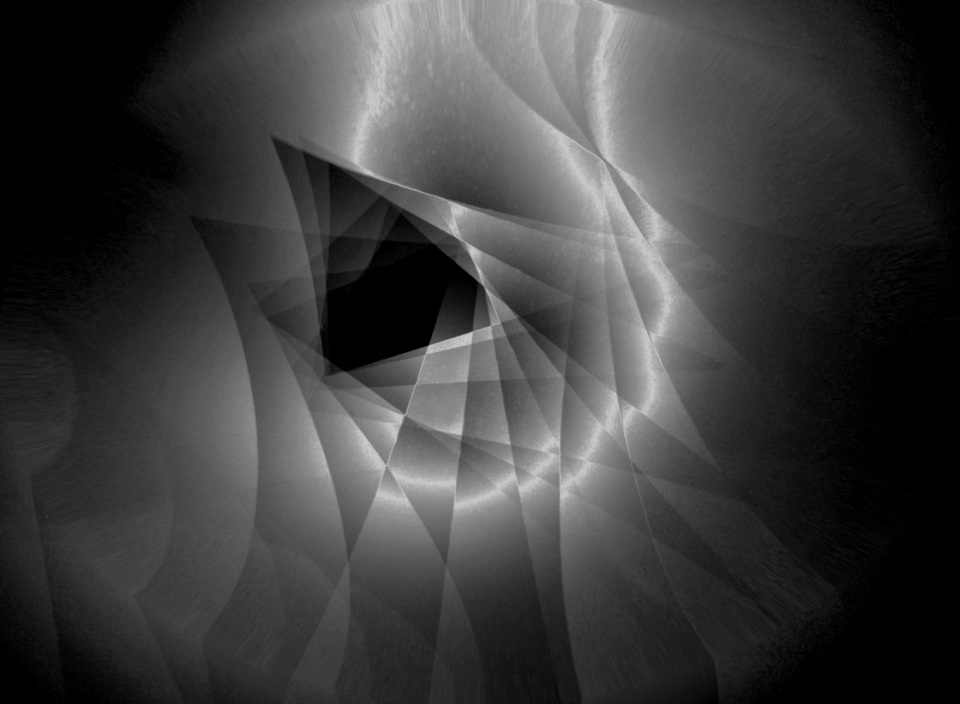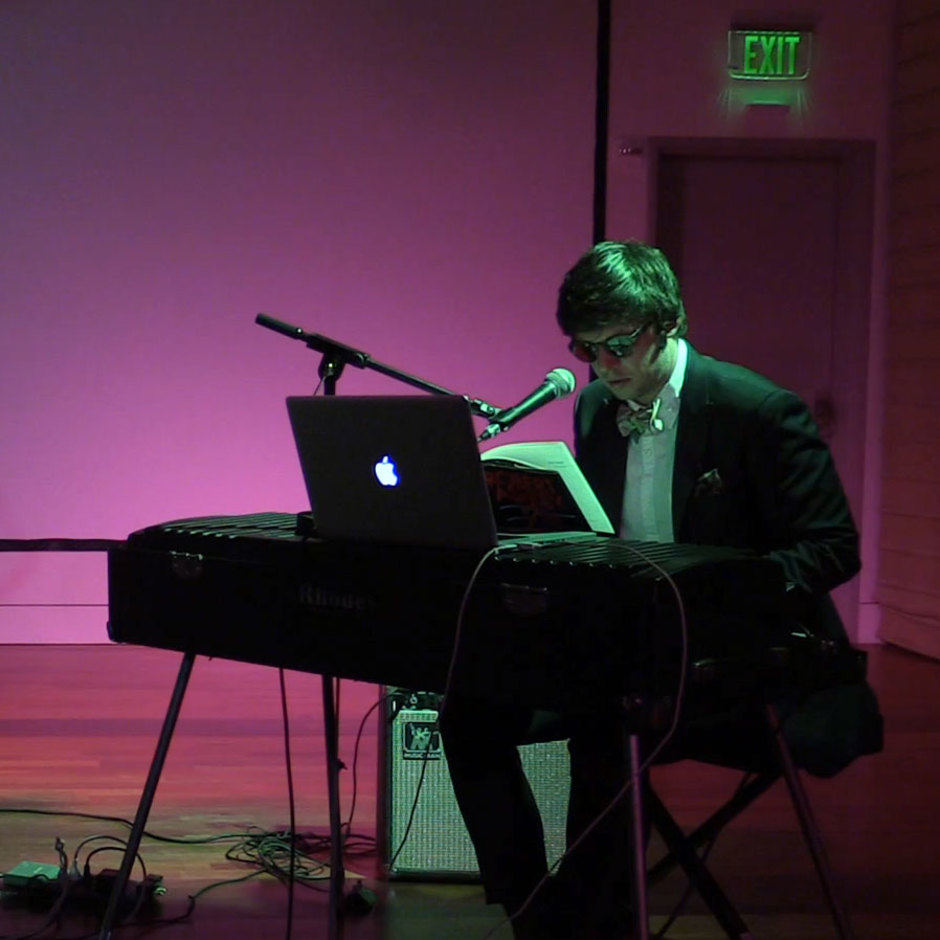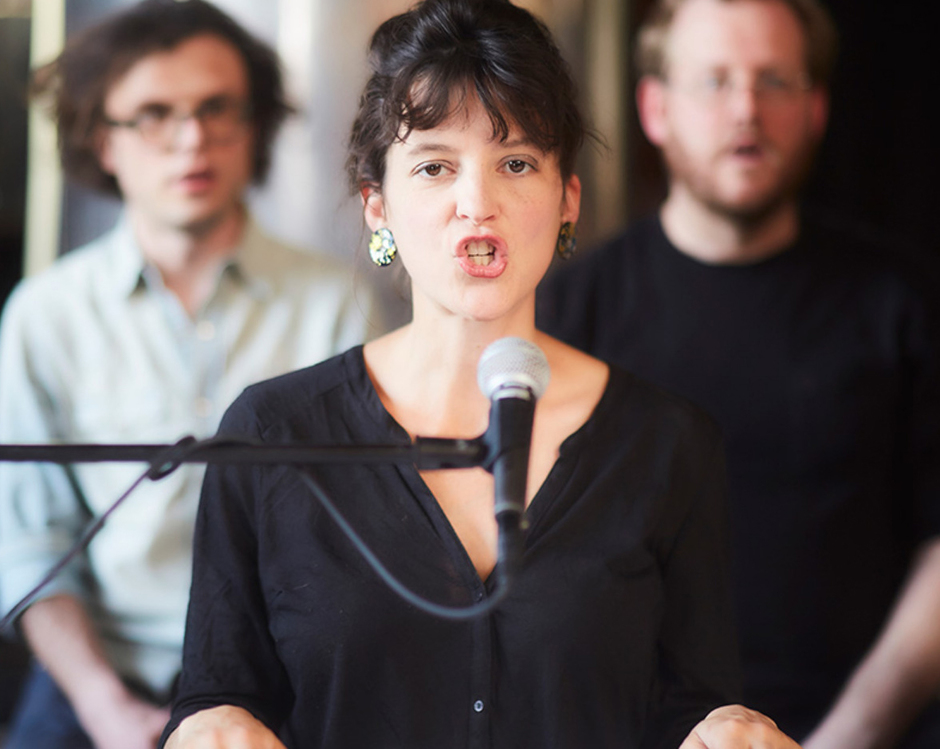
Experimental Music Yearbook
Add to Calendar
$20 / $15 Artists & Students
Indexical & The Experimental Music Yearbook present four artists whose work resonates with language and movement in the context of musical practice.
The Experimental Music Yearbook turns its focused Westward this year, and is featuring experimental minds who create on the left. Andrew C. Smith & John Hastings deviate from linguistic sense with a simultaneity of voices, both computer-generated and live. Jessie Marino and Natacha Diels (of Ensemble Pamplemousse & On Structure) perform solo pieces involving video, context, and movement.
Andrew C. Smith:
How To Get There From Here

Language, like music, cannot communicate meaning without substance. There’s the material, and then the semantic baggage which only develops through usage and historical context. The sound of language changes how we interpret its meaning, but the meaning of the words determines how we speak them in everyday practice.
How To Get There From Here transforms the phrase “we remember not the word, but the sound of the word” in three movements. The first is drawn from 1,600 segments of speech arranged first as a fixed media electronic composition through stochastic principles and then transcribed as International Phonetic Alphabet symbols for human performance. The second is a transformation on the spelled words themselves, moving from one word to the next by making simple edits: adding, removing, or editing letters. This final movement is constructed entirely of quotations from English texts ranging in date from the 14th to 20th centuries.
Andrew C. Smith is a composer and keyboardist living in Santa Cruz, California. His music often involves just intonation tunings, repetition, and language at the threshold of making sense. In addition to his work with language, he uses computers in his everyday artistic practice, often using electronic means to manipulate sound and text, using the results of these manipulations in his work.
He has been producing concerts and recordings since 2011, and is currently the Executive Director of Indexical, a nonprofit organization based in Santa Cruz, California. He has previously produced events at Carnegie Hall, Lincoln Center (Alice Tully Hall), Bohemian National Hall, and other venues as Managing Director of the S.E.M. Ensemble (Brooklyn, NY), and has worked for the Seattle Symphony (Seattle, WA) and Issue Project Room (Brooklyn, NY).
His music has been performed by sfSound, String Noise, Guidonian Hand Trombone Quartet, Séverine Ballon, Ostravaská banda, and S.E.M. Ensemble. He studied English and music composition at Willamette University and Trinity College Dublin.
Andrew C. Smith:
Reconstruction

Reconstruction, for solo speaking voice and electronics, is a poem and performance dealing with memory, writing, and the way that one affects the other. The electronics consist entirely of fragments of speech drawn from the live performance, rearranged to yield an absent text that is not spoken.
Andrew C. Smith is a composer and keyboardist living in Santa Cruz, California. His music often involves just intonation tunings, repetition, and language at the threshold of making sense. In addition to his work with language, he uses computers in his everyday artistic practice, often using electronic means to manipulate sound and text, using the results of these manipulations in his work.
He has been producing concerts and recordings since 2011, and is currently the Executive Director of Indexical, a nonprofit organization based in Santa Cruz, California. He has previously produced events at Carnegie Hall, Lincoln Center (Alice Tully Hall), Bohemian National Hall, and other venues as Managing Director of the S.E.M. Ensemble (Brooklyn, NY), and has worked for the Seattle Symphony (Seattle, WA) and Issue Project Room (Brooklyn, NY).
His music has been performed by sfSound, String Noise, Guidonian Hand Trombone Quartet, Séverine Ballon, Ostravaská banda, and S.E.M. Ensemble. He studied English and music composition at Willamette University and Trinity College Dublin.
Jessie Marino:
Having a Conversation about Truth with a Tea Pot aka, All I know is what the Media Taught Me.
John Hastings:
Text Operations from the Former World, Nos. 1 & 2
Natacha Diels:
Operations Manual (Self-portrait)

Natacha Diels’ work combines ritual, improvisation, traditional instrumental practice, and cynical play to create worlds of curiosity and unease. Recent work includes the completion of a series of fairytales/nightmares for performers, and the construction of a Portal with her performance duo On Structure.
Natacha founded the experimental music collective Ensemble Pamplemousse in 2003, and continues to be its director and flautist. In 2009 she co-founded the performance duo On Structure with Jessie Marino. Pamplemousse specializes in unique aspects of composition and new music, from complex virtuosic instrumental performance to experimental theatre to electronic and robotic performance. Inexorably uncompromising, the group has developed its name by presenting exquisitely challenging music at both internationally recognized festivals such as Borealis Festival (Norway) and Transparent Sound Festival (Budapest), and lesser-known gems such as Louisville’s Experimental Music Festival (KY). On Structure is a sound-centric highly choreographed paradoxically improvisatory collaboration project, performing whenever travel paths collide. In 2016, On Structure was featured at SPOR Festival (DK) and Omaha Under the Radar (Nebraska).
With a focus on choreographed movement, traditional instrumental technique, and a wide array of DIY electronics, Natacha’s compositions have been described as “a fairy tale for a fractured world” (Music We Care About) and “fantastic playful modern chamber music full of magic and wit” (Vital Weekly). As composer, she has been featured at international festivals such as Darmstadt International Summer Institute (DE), SPOR Festival (DK), Borealis Festival (NO), Mostly Mozart at Lincoln Center (NYC), Maerz Musik (DE), Sweet Thunder (SF), and MATA Festival (NYC), among others. She has written works for Ensemble Pamplemousse, TAK Ensemble, JACK quartet, Ensemble Adapter, ICE, Talea Ensemble, Dal Niente Ensemble, Anne LaBerge and Diamanda Dramm; and soloists Maria Stankova, Ross Karre, and Heather Roche. Her music been performed by ensembles worldwide such as Mocrep, Plus/Minus, the San Francisco Contemporary Music Players, the New York New Music Ensemble, and Sonar Quartet.
As flautist, Natacha's performance has been likened to “an insane, barking bird who can’t find his way out of his own birdcage” (The Sound Projector).
Natacha has taught courses in electronic and computer music at Columbia University and Parson’s School of Design; and has conducted numerous workshops or lectures in composition and computer music at schools such as the School at the Art Institute of Chicago, Columbia College, Wesleyan University, and University of Southern California. A devoted teacher of all ages, Natacha has also designed and taught workshops to children at the Montessori School of Raleigh, the Upper Catskill Community Center for the Arts, and a summer music camp in Léogane, Haiti. She holds degrees in flute performance and integrated digital media from NYU, in music composition from Columbia University, and currently teaches composition and computer music at the University of California, San Diego.
Experimental Music Yearbook
Add to Calendar
$20 / $15 Artists & Students
